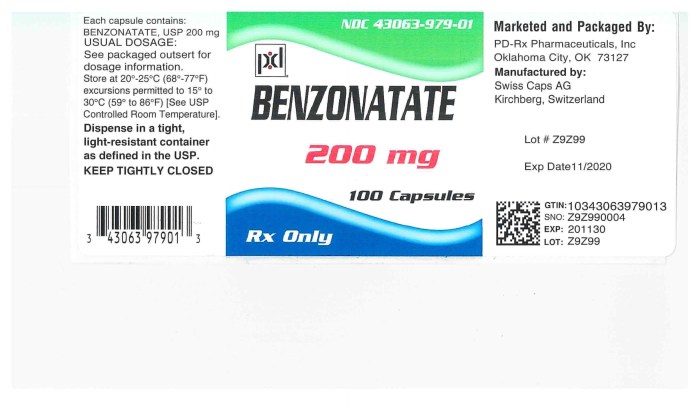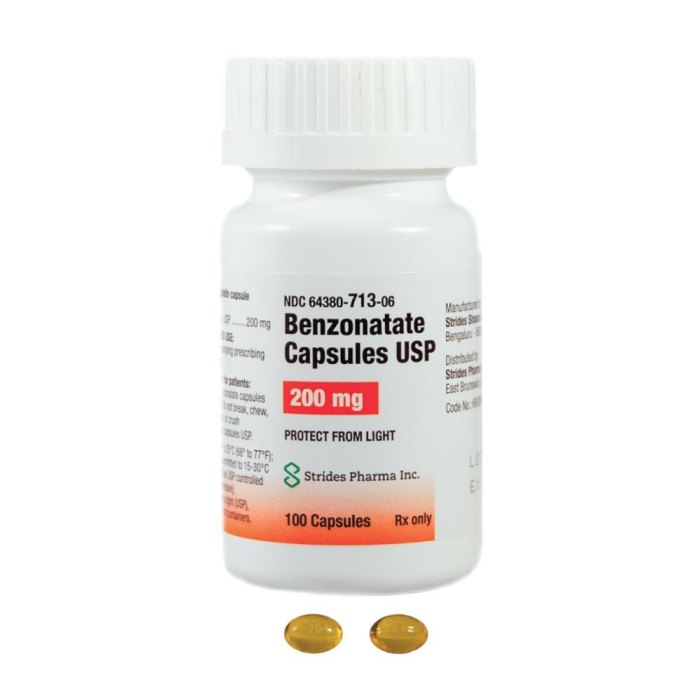Benzonatate 200 mg, a commonly prescribed medication for cough relief, offers a unique approach to managing this often bothersome symptom. This medication, classified as a non-narcotic cough suppressant, works by directly affecting the receptors in the respiratory tract that trigger the cough reflex. By understanding how benzonatate 200 mg works, its potential side effects, and its appropriate use, patients can make informed decisions about their treatment options.
This article provides a detailed overview of benzonatate 200 mg, exploring its mechanism of action, therapeutic uses, and potential risks. We will delve into the pharmacokinetics of this medication, including its absorption, distribution, metabolism, and excretion. Additionally, we will discuss important considerations regarding drug interactions and patient information, ensuring a comprehensive understanding of this medication.
Side Effects and Risks: Benzonatate 200 Mg

Benzonatate, like most medications, can cause side effects. While these side effects are usually mild and temporary, it’s important to be aware of them and to seek medical attention if they become severe or persist.
Common Side Effects
Common side effects of benzonatate include:
- Dizziness
- Headache
- Nausea
- Constipation
- Drowsiness
Serious Side Effects
While rare, benzonatate can also cause serious side effects. These include:
- Allergic reactions, such as rash, itching, swelling, or difficulty breathing. If you experience any of these symptoms, stop taking benzonatate and seek immediate medical attention.
- Severe liver problems, which may be indicated by yellowing of the skin or eyes, dark urine, or abdominal pain. Seek medical attention immediately if you experience any of these symptoms.
- Low blood pressure, which can cause dizziness, lightheadedness, or fainting. Seek medical attention if you experience any of these symptoms.
Contraindications, Benzonatate 200 mg
Benzonatate is contraindicated in certain individuals, including those with:
- A known allergy to benzonatate or any of its ingredients.
- A history of severe liver disease.
- A history of glaucoma.
- A history of urinary retention.
Monitoring Patients for Adverse Reactions
It is important to monitor patients for adverse reactions to benzonatate, especially during the initial stages of treatment. This includes:
- Monitoring vital signs, such as blood pressure, heart rate, and respiratory rate.
- Assessing for any signs of allergic reaction or other serious side effects.
- Encouraging patients to report any unusual symptoms they experience.
Drug Interactions
Benzonatate 200 mg can interact with other medications, potentially affecting their effectiveness or increasing the risk of side effects. Understanding these interactions is crucial for safe and effective treatment.
Interactions with Other Medications
Drug interactions with benzonatate 200 mg can occur due to various mechanisms, including:
- Pharmacokinetic Interactions: These involve changes in the absorption, distribution, metabolism, or excretion of benzonatate or other medications. For instance, medications that induce CYP3A4, the enzyme responsible for metabolizing benzonatate, might lead to faster breakdown of benzonatate, potentially reducing its effectiveness. Conversely, medications that inhibit CYP3A4 could prolong benzonatate’s effects, increasing the risk of side effects.
- Pharmacodynamic Interactions: These involve interactions at the site of action, where medications might compete for the same receptors or have synergistic or antagonistic effects. For example, benzonatate, like other cough suppressants, might potentiate the effects of central nervous system depressants, such as alcohol or benzodiazepines, increasing the risk of drowsiness and sedation.
Examples of Potential Interactions
- CYP3A4 Inducers: Medications like rifampin, carbamazepine, and phenytoin can induce CYP3A4, potentially reducing benzonatate’s effectiveness.
- CYP3A4 Inhibitors: Medications like ketoconazole, erythromycin, and grapefruit juice can inhibit CYP3A4, potentially increasing benzonatate’s levels and increasing the risk of side effects.
- Central Nervous System Depressants: Medications like alcohol, benzodiazepines, and opioids can enhance the sedative effects of benzonatate, increasing the risk of drowsiness and respiratory depression.
Managing Drug Interactions
- Inform Your Healthcare Provider: Always inform your healthcare provider about all medications, including over-the-counter drugs, herbal supplements, and vitamins, you are taking or planning to take. This information is crucial for identifying potential interactions and ensuring safe and effective treatment.
- Monitor for Side Effects: Pay attention to any new or worsening symptoms after starting or changing medications. If you experience any unusual side effects, contact your healthcare provider immediately.
- Follow Your Healthcare Provider’s Instructions: Carefully follow your healthcare provider’s instructions regarding dosage, frequency, and duration of treatment. Do not adjust your medication regimen without consulting your healthcare provider.
Patient Information

Benzonatate is a medication used to treat coughs. It works by numbing the nerves in the lungs and airways, which helps to reduce the urge to cough. This information sheet provides essential details about Benzonatate 200 mg.
Key Information for Patients
This table summarizes crucial information about Benzonatate 200 mg for patients:
| Information | Details |
|---|---|
| Dosage | The usual dose is 100 mg to 200 mg, taken three or four times a day. Your doctor will determine the appropriate dosage based on your individual needs. |
| Administration | Benzonatate is taken by mouth. Swallow the capsules whole with a glass of water. Do not chew or crush the capsules. |
| Side Effects | Common side effects include drowsiness, dizziness, headache, and stomach upset. Inform your doctor if you experience any side effects. |
| Precautions | Avoid driving or operating machinery until you know how this medication affects you. Do not take Benzonatate if you are allergic to it or have any other allergies. |
| Storage | Store Benzonatate at room temperature, away from heat and moisture. Keep it out of reach of children and pets. |
Patient Education Leaflet
Benzonatate 200 mg is a medicine used to treat coughs. It works by numbing the nerves in your lungs and airways, which helps to reduce the urge to cough. This leaflet provides essential information about using Benzonatate 200 mg safely and effectively.
How to take Benzonatate 200 mg
- Take Benzonatate 200 mg exactly as your doctor has prescribed.
- Swallow the capsules whole with a glass of water. Do not chew or crush the capsules.
- Take the capsules at evenly spaced intervals throughout the day.
- Do not take more than the prescribed dosage.
- If you miss a dose, take it as soon as you remember, unless it is almost time for your next dose. Do not take a double dose to make up for a missed dose.
Possible Side Effects
- Benzonatate can cause side effects. Common side effects include drowsiness, dizziness, headache, and stomach upset.
- If you experience any side effects, talk to your doctor or pharmacist.
- If you experience any serious side effects, such as difficulty breathing, chest pain, or swelling of the face, mouth, or throat, seek immediate medical attention.
Precautions
- Do not take Benzonatate if you are allergic to it or any of its ingredients.
- Avoid driving or operating machinery until you know how this medication affects you.
- Do not take Benzonatate if you are pregnant or breastfeeding without talking to your doctor.
- If you are taking any other medications, including over-the-counter medications, vitamins, or herbal supplements, talk to your doctor before taking Benzonatate.
Storage
- Store Benzonatate at room temperature, away from heat and moisture.
- Keep it out of reach of children and pets.
- Do not use Benzonatate after the expiration date printed on the bottle.
Important Information
- This leaflet provides a summary of information about Benzonatate 200 mg. It is not a substitute for talking to your doctor or pharmacist.
- Always ask your doctor or pharmacist if you have any questions about Benzonatate 200 mg.
- Keep all medications out of reach of children.
- Never share your medication with others.
Research and Development
Benzonatate 200 mg, a non-narcotic antitussive medication, has been used for decades to effectively suppress coughs. However, ongoing research continues to explore its potential applications and mechanisms of action.
Current Research on Benzonatate 200 mg
Current research focuses on understanding the precise mechanisms of action of benzonatate 200 mg and its potential applications beyond cough suppression. This includes investigating its role in managing other respiratory conditions, exploring its potential as an analgesic, and examining its interactions with other medications.
Ongoing Clinical Trials and Studies
Several ongoing clinical trials and studies are investigating the efficacy and safety of benzonatate 200 mg in various settings.
- One study is evaluating the effectiveness of benzonatate 200 mg in managing chronic obstructive pulmonary disease (COPD) exacerbations.
- Another study is investigating the potential of benzonatate 200 mg as an adjunct therapy for pain management in patients with chronic pain conditions.
- Researchers are also exploring the use of benzonatate 200 mg in combination with other medications to enhance cough suppression in specific patient populations.
Future Directions and Advancements
Future research on benzonatate 200 mg may focus on developing novel formulations to improve its bioavailability and duration of action. Researchers may also investigate the potential for developing new drug delivery systems, such as inhalable or transdermal formulations, to enhance its effectiveness and patient compliance.
Historical Context
Benzonatate, a non-narcotic antitussive medication, has a rich history that spans several decades. Its discovery and development were driven by the need for a safe and effective alternative to traditional cough suppressants, many of which had undesirable side effects. The journey of benzonatate is marked by key milestones and influential figures who contributed to its establishment as a valuable therapeutic option.
Discovery and Development
Benzonatate’s story begins in the mid-20th century. It was first synthesized in the 1950s by researchers at the pharmaceutical company, Pfizer. The initial focus was on exploring its potential as a local anesthetic, but during clinical trials, its antitussive properties became apparent. This unexpected finding led to a shift in research direction, ultimately paving the way for its approval as a cough suppressant.
Benzonatate 200 mg stands as a valuable tool in managing cough symptoms, offering relief for a variety of conditions. Its unique mechanism of action, targeting specific receptors in the respiratory tract, sets it apart from other cough suppressants. While generally well-tolerated, potential side effects and drug interactions require careful consideration. By understanding the nuances of this medication, healthcare professionals and patients can make informed decisions to optimize its use for effective cough relief.
Benzonatate 200 mg is a medication used to relieve coughs. While it works on the cough itself, it doesn’t address the underlying cause. For skin conditions like actinic keratosis, a common precancerous skin growth, you might consider using efudex , a topical medication that can help clear these lesions. However, it’s important to consult a doctor before using either benzonatate or efudex, as they may not be suitable for everyone.